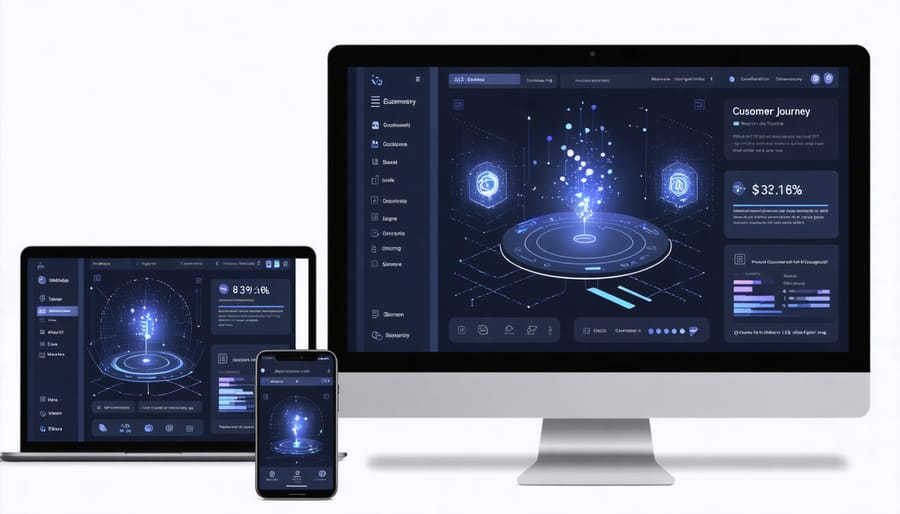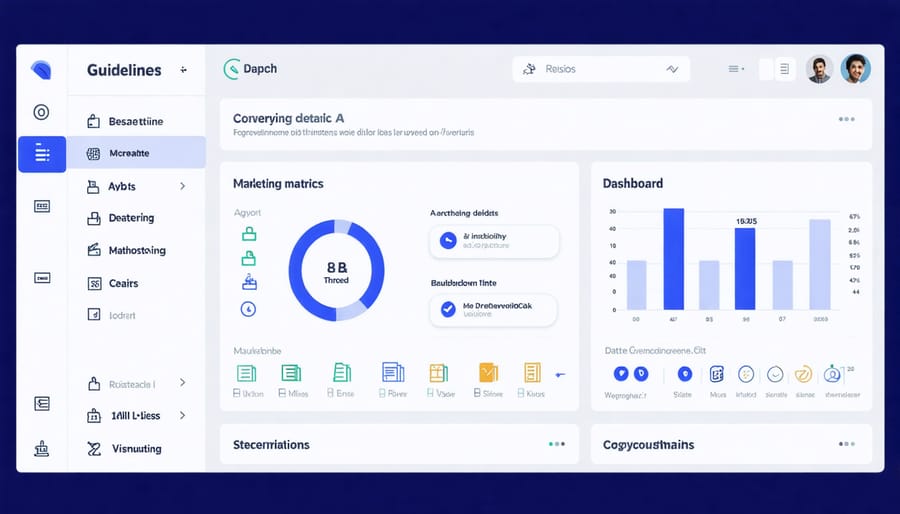AI-Powered KPIs Transform Digital Marketing Performance (Real Results Inside)

Transform your digital marketing strategy with data-driven KPIs that directly impact revenue growth and customer acquisition. Modern businesses leverage AI-powered marketing performance metrics to automate tracking, analyze patterns, and make real-time optimization decisions.
Key performance indicators serve as your marketing dashboard’s vital signs, revealing exactly where your campaigns succeed or need adjustment. By focusing on conversion rates, customer acquisition costs (CAC), return on ad spend (ROAS), and engagement metrics, businesses can allocate resources more effectively and maximize their digital marketing ROI.
The right KPIs eliminate guesswork from your marketing decisions, enabling precise targeting, personalized customer experiences, and measurable business outcomes. Whether you’re running social media campaigns, email marketing initiatives, or content marketing programs, these metrics provide clear visibility into performance and guide strategic improvements.
This comprehensive guide explores essential digital marketing KPIs, implementation strategies, and automated tracking solutions that help businesses scale their marketing efforts efficiently while maintaining focus on what truly drives growth.
Essential AI-Enhanced KPIs for Modern Digital Marketing
Customer Engagement Metrics
Modern digital marketing relies heavily on customer engagement metrics to understand and optimize user interactions. AI-powered tracking systems now offer unprecedented insights into how users interact with your digital content, providing real-time data that helps shape marketing strategies.
These intelligent systems monitor key behavioral indicators such as time spent on page, scroll depth, and click patterns. They analyze user journeys across multiple touchpoints, creating detailed engagement profiles that reveal which content resonates most effectively with your audience. The AI algorithms can detect subtle patterns in user behavior that might be missed by traditional analytics, such as identifying the optimal timing for content delivery or predicting when a user is most likely to convert.
Engagement scores are automatically calculated based on multiple factors, including:
– Frequency of visits
– Interactive elements clicked
– Social media interactions
– Content sharing behavior
– Comment participation
– Email response rates
– Video watch time
These metrics are particularly valuable because they go beyond basic page views and clicks, offering deeper insights into audience interest and intent. The AI system continuously learns from user interactions, refining its understanding of engagement patterns and automatically adjusting scoring mechanisms to reflect evolving user behaviors. This dynamic approach ensures that your engagement metrics remain relevant and actionable, helping you make data-driven decisions to improve your digital marketing strategy.

Conversion Analytics
Conversion analytics has evolved beyond simple tracking of sales and lead generation, incorporating sophisticated predictive analysis and attribution modeling to provide deeper insights into customer behavior. By leveraging advanced tracking mechanisms, businesses can now understand not just when conversions happen, but also predict future conversion patterns and accurately attribute success to specific marketing channels.
Multi-touch attribution modeling allows marketers to track the entire customer journey, from initial awareness to final conversion. This approach helps identify which touchpoints contribute most significantly to conversions, enabling more efficient budget allocation and campaign optimization. For instance, you might discover that while social media rarely leads to direct conversions, it plays a crucial role in initiating customer relationships that later convert through email marketing.
Predictive analytics takes this further by using historical data and machine learning to forecast future conversion rates and identify high-value prospects. This technology enables marketers to:
– Identify patterns in user behavior that indicate high conversion probability
– Optimize marketing spend based on predicted ROI
– Personalize content and offers for different user segments
– Anticipate and prevent conversion drop-offs
When implementing conversion analytics, focus on establishing clear conversion goals, setting up proper tracking parameters, and regularly reviewing attribution models to ensure they reflect your current business objectives. Remember that conversion paths are rarely linear, and understanding the complex interplay between different marketing channels is key to optimizing your overall conversion strategy.
ROI Measurement
Modern digital marketing demands precise ROI tracking, and AI-driven analytics have revolutionized how businesses measure their marketing success. By implementing advanced ROI measurement strategies, companies can now track and analyze multiple data points simultaneously, providing deeper insights into campaign performance.
AI algorithms can automatically calculate ROI by considering various factors such as customer acquisition costs, lifetime value, conversion rates, and attribution modeling. This sophisticated approach eliminates manual calculations and reduces human error, allowing marketers to make data-driven decisions quickly.
Key benefits of AI-powered ROI measurement include:
– Real-time performance tracking
– Multi-channel attribution analysis
– Predictive analytics for future campaigns
– Automated reporting and insights generation
– Dynamic budget allocation recommendations
The system can identify which marketing channels deliver the highest returns and automatically adjust spending accordingly. For example, if social media campaigns consistently outperform email marketing, the AI can recommend shifting budget allocation to maximize returns.
By combining historical data with machine learning capabilities, these tools can also predict future ROI trends and suggest optimizations before campaigns launch. This proactive approach helps businesses minimize waste and maximize marketing effectiveness while maintaining clear visibility into their investment returns.
Real-Time Performance Monitoring
Automated Dashboard Solutions
Modern digital marketing demands real-time insights, and automated dashboard solutions make this possible by consolidating key metrics in one accessible location. Popular platforms like Google Data Studio, Tableau, and Looker offer customizable dashboards that pull data from multiple sources, providing a comprehensive view of your marketing performance.
These tools automatically refresh data at set intervals, eliminating manual reporting tasks and reducing human error. Marketing teams can set up automated alerts for KPI thresholds, ensuring immediate notification when metrics fall below or exceed specified targets.
Most dashboard solutions integrate seamlessly with common marketing platforms, including Google Analytics, social media channels, and CRM systems. This integration enables marketers to track customer journey metrics, campaign performance, and ROI in real-time.
Key features to look for in dashboard solutions include:
– Customizable visualization options
– Mobile accessibility
– Automated report scheduling
– Data export capabilities
– Role-based access controls
– Historical data comparison
When selecting a dashboard solution, consider your team’s technical expertise, budget constraints, and specific reporting needs. The right tool should simplify KPI tracking while providing actionable insights that drive marketing decisions.

Predictive Analytics Integration
Modern digital marketing campaigns are being revolutionized by predictive analytics in marketing, which harnesses AI technology to forecast performance trends and make data-driven decisions. This powerful tool analyzes historical KPI data to identify patterns and predict future outcomes, allowing marketers to optimize campaigns before they even launch.
By incorporating predictive analytics into your KPI tracking, you can anticipate customer behavior, identify potential market opportunities, and adjust your strategies proactively rather than reactively. The system can forecast key metrics such as conversion rates, customer lifetime value, and engagement levels, enabling more precise budget allocation and resource management.
Real-world applications include predicting which content types will perform best, determining optimal posting times, and identifying audience segments most likely to convert. These insights help marketers automate decision-making processes and focus efforts on high-potential activities. For example, AI can analyze past campaign performance to recommend the most effective channel mix for reaching specific audience segments.
The key benefit is the ability to move from descriptive to prescriptive analytics, turning your KPI data into actionable insights that drive better marketing outcomes.

Implementing AI-Enhanced KPI Tracking
Implementing AI-powered KPI tracking doesn’t have to be complicated. Start by identifying which metrics matter most to your business goals and selecting an AI-enabled analytics platform that specializes in those areas. Popular options include automated dashboard solutions that can pull data from multiple sources and provide real-time insights.
Begin with a pilot program focusing on 2-3 key metrics. This could include customer acquisition cost (CAC), conversion rates, or engagement metrics. Set up your AI system to monitor these metrics continuously and establish baseline measurements for comparison.
Configure your AI tools to send automated alerts when metrics deviate from expected ranges. This proactive approach helps you identify and address issues before they impact your bottom line. Many platforms offer customizable threshold settings and can deliver notifications via email or mobile apps.
Next, integrate machine learning capabilities to identify patterns and trends in your data. These insights can help predict future performance and suggest optimization strategies. For example, AI can analyze which content types generate the highest engagement or which customer segments deliver the best ROI.
Ensure your team receives proper training on the new system and establish clear protocols for acting on AI-generated insights. Regular review sessions help team members understand the data and make informed decisions. Consider creating a response flowchart for different types of alerts or performance indicators.
Remember to regularly calibrate your AI system based on business changes and new objectives. This ensures your KPI tracking remains aligned with your evolving marketing strategy.
AI-enhanced KPIs are revolutionizing digital marketing by providing deeper insights, more accurate predictions, and automated optimization capabilities. By leveraging artificial intelligence, businesses can now track and analyze marketing performance with unprecedented precision while saving valuable time and resources. The future of digital marketing metrics looks increasingly automated, with AI systems becoming more sophisticated in interpreting data patterns and making real-time adjustments to campaigns. As technology continues to evolve, we can expect even more advanced KPI tracking solutions that will help businesses make better-informed decisions and achieve higher ROI. Companies that embrace these AI-powered analytics tools today will be better positioned to stay competitive and adapt to changing market conditions. The key to success lies in choosing the right KPIs, implementing proper tracking systems, and consistently using the insights gained to refine marketing strategies.
Leave a Reply